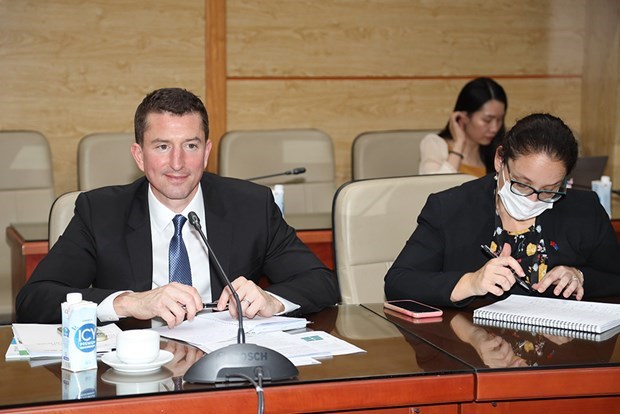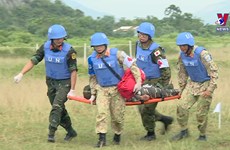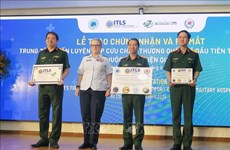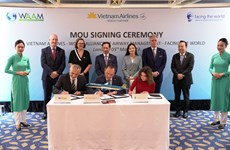Australian support helps Vietnam control COVID-19 pandemic: health official
Australia's assistance for Vietnam has contributed to helping Vietnam effectively control the COVID-19 pandemic and promptly resume socio-economic development activities.
 One in five refrigerating trucks delivered to Vietnam through a partnership between Australia, UNICEF and the Vietnamese Ministry of Health. (Photo: VietnamPlus)
One in five refrigerating trucks delivered to Vietnam through a partnership between Australia, UNICEF and the Vietnamese Ministry of Health. (Photo: VietnamPlus)Deputy Minister of Health Nguyen Lien Huong stated this at a reception for Australian Deputy Ambassador to Vietnam Mark Tattersall in Hanoi on November 15.
First Secretary and Development Counsellor of the Australian Embassy to Vietnam Catherine Gottlieb and Cherie Russell, Secretary of the Australian Expert Technical Assistance Programme for Regional COVID-19 Vaccine Access Shiva Shrestha, and Country Director of Woolcock Institute of Australia Nguyen Thu Anh attended the reception.
Deputy Health Minister Huong thanked the Australian government and people for their support to the Vietnamese health sector in recent times. She stated that health cooperation between Vietnam and Australia has been enhanced through implementing activities between specialised technical units of the two countries.
In the fight against the COVID-19 pandemic, Vietnam received over 25 million doses of vaccines for children and adults, and other medical supplies donated by the Australian side. The Oceania country also helped Vietnam improve and strengthen the capacity of staff involved in the pandemic prevention and control.
At the meeting, the two sides discussed Australia's support for Vietnam in accessing COVID-19 vaccines and health security, Australia's technical assistance through the Australian Expert Technical Assistance Programme for Regional COVID-19 Vaccine Access from the National Centre for Immunisation Research and Surveillance (NCIRS), and the Woolcock Institute and the Murdoch Children's Research Institute.They also focused on the possibility of cooperation and other technical assistance needs.
Deputy Minister Huong said Vietnam has effectively implemented the COVID-19 vaccination strategy with a high coverage compared to other countries.
According to the health official, although the MoH and related units and localities have promoted communication in many different forms, Vietnam still faces difficulties in giving the 3rd COVID-19 vaccine shots for people aged 12-17, and the 2nd shots for those aged 5 -11.
She blamed the situation on the people’s fear of vaccine side effects affecting children's health, and other factors.
The MoH hoped that the Australian side will continue its support to the Vietnamese health sector in not only vaccine but also in the professional and technical work, and experience in communication activities and vaccination.
“We hope that medical cooperation between the two sides will be increasingly promoted in the fields of health security, infectious disease prevention, scientific and vaccine research, and sharing professional experience,” she said.
 Australian Deputy Ambassador to Vietnam Mark Tattersall (Photo: VietnamPlus)
Australian Deputy Ambassador to Vietnam Mark Tattersall (Photo: VietnamPlus)Australian Deputy Ambassador to Vietnam Mark Tattersall praised the Vietnamese health sector for its efforts and achievements in the public health care in general and in the fight against the COVID-19 pandemic in particular.
Australia has with difficulties similar to those facing Vietnam in giving COVID-19 vaccine shots to people, he said, adding that his country is also promoting communication campaigns to raise public awareness of the issue.
Tattersall highlighted the effective health cooperation between the two countries, saying that Australia will continue to support Vietnam in issues related to COVID-19 vaccination and other vaccination programmes.
Recently, Australia provided an additional 4.2 million doses of Pfizer-BioNtech vaccine to Vietnam through UNICEF in partnership with the MoH.
Besides, five refrigerating trucks have also been delivered to Vietnam through a partnership between Australia, UNICEF and the MoH. These trucks were stationed at the National Institute of Hygiene and Epidemiology in Hanoi, Pasteur Institute in Ho Chi Minh City, Pasteur Institute in Nha Trang and the Central Highlands Institute of Hygiene and Epidemiology in the Central Highlands province of Dak Lak./.













